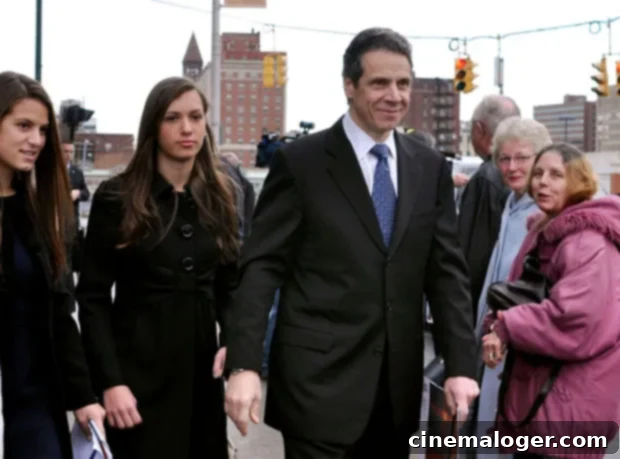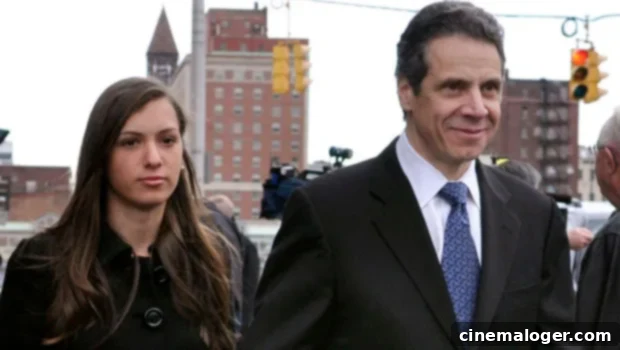Mariah Kennedy Cuomo Offers Steadfast Support to Father Andrew Amid Mounting Harassment Scandal and Resignation Calls
In a period of immense personal and political turmoil for former New York Governor Andrew Cuomo, his daughter, Mariah Kennedy Cuomo, emerged as a visible source of comfort and unwavering support. On March 12, as the state capitol buzzed with intensified calls for his resignation, Governor Cuomo was observed pacing the grounds of the historic Governor’s Mansion in Albany, visibly distressed. By his side was his 26-year-old daughter, Mariah, who, despite appearing equally strained by the circumstances, offered a steadying presence to her embattled father.
The scene unfolded against a backdrop of grave accusations. Seven women had by this point come forward, alleging sexual harassment against the governor, plunging his administration into a deep crisis. Mariah’s public display of solidarity during this fraught time resonated with many, underscoring the complexities of family loyalty amidst a public scandal.
A Daughter’s Comfort Amidst Political Storm
During their contemplative walk, Mariah was photographed linking arms with her father, who was engrossed in a phone conversation, his expression grim. She carried her phone, a charger, and a soda, embodying a sense of prepared and enduring support. Mariah, an activist known for her leadership in New York’s “Wear A Mask” ad contest in 2020, appeared to be making a deliberate statement of familial unity and strength in the face of escalating demands for her father to vacate his office.
This public moment provided a rare glimpse into the personal toll the scandal was taking on the Cuomo family. While the political pressure mounted from every corner, Mariah’s presence offered a poignant reminder of the human element often overshadowed by the relentless news cycle. Her actions suggested a deep personal commitment to standing by her father, irrespective of the political maelstrom surrounding him. This was not merely a private family moment; by virtue of their public roles and the setting, it became a symbolic representation of familial support in a time of intense scrutiny.

The Escalation of Allegations and Cuomo’s Defiant Stance
The situation intensified significantly on March 12 when a seventh woman publicly accused Governor Cuomo of touching her without her consent. This new allegation served as a tipping point, prompting a cascade of urgent calls from influential New York politicians for Cuomo to resign immediately. Throughout the unfolding scandal, Governor Cuomo maintained a resolute and defiant posture, consistently refusing to step down. In a press conference held on the same day, March 12, he firmly declared his unwillingness to yield to what he termed “cancel culture.”
Cuomo did not shy away from directly confronting his critics, specifically targeting prominent figures such as Senators Chuck Schumer and Kirsten Gillibrand, and Representative Alexandria Ocasio-Cortez, all of whom had publicly condemned his alleged behavior and advocated for his resignation. He articulated his belief that politicians often take positions based on expediency and succumb to pressure, rather than truth. “Politicians take positions for all sorts of reasons including political expediency and bowing to pressure,” he stated with conviction. He emphasized, “People know the difference between playing politics, bowing to cancel culture and the truth… let the review proceed.” His words underscored a deep conviction that his political adversaries were capitalizing on the accusations for their own gain.
In a further demonstration of his resolve, Cuomo unequivocally stated, “I am not going to resign. I was not elected by the politicians. I was elected by the people – part of this is that I am not part of the political club and you know what, I’m proud of it.” This declaration highlighted his populist appeal and his perceived independence from the political establishment, a narrative he had cultivated throughout his career. At the time, the New York Attorney General’s office had already launched an independent investigation into the myriad allegations, a process Cuomo pledged to cooperate with fully.
Cuomo’s Earlier Apology and Its Reception
Prior to these escalated demands and additional allegations, Governor Cuomo had issued an apology on March 3 to his accusers, acknowledging that he had made them “uncomfortable.” This initial apology came when only three women had publicly come forward with their claims. His statement then was an attempt to address the brewing controversy and perhaps quell the early criticisms.
“I want to address the recent allegations that have been made against me,” New York Gov. Cuomo says.
“I will fully cooperate with that review,” he adds, of New York Attorney General investigation. https://t.co/IcYIgdtH6t pic.twitter.com/jYLt9UZBIv
— ABC News (@ABC) March 3, 2021
In his March 3 remarks, the governor expressed regret, stating, “I feel terrible these people felt uncomfortable, felt hurt, felt pain from the interactions.” He further admitted, “I now understand that I acted in a way that made people feel uncomfortable. It was unintentional and I truly and deeply apologize for it. I feel awful about it and, frankly, I am embarrassed by it… I’ve learned an important lesson. I’m sorry for whatever pain I caused anyone. I never intended it. And I will be the better for this experience.”
This early apology, however, was quickly overshadowed by the subsequent emergence of more accusers and the increasing severity of their allegations. While Cuomo articulated a learning experience, many critics and members of the public felt his apology fell short, failing to adequately address the gravity of the accusations or to take full responsibility for his actions. The distinction between making someone “uncomfortable” and alleged sexual harassment became a focal point of public debate, casting doubt on the sincerity and sufficiency of his initial mea culpa.
The Broader Impact: Governance, Public Trust, and Family Resilience
The Andrew Cuomo scandal transcended personal allegations, deeply impacting the political landscape of New York and challenging public trust in leadership. As the governor became embroiled in personal defenses and political battles, questions arose about his ability to effectively govern the state, especially at a time when New York was grappling with post-pandemic recovery and other pressing issues. The constant calls for his resignation and the ongoing Attorney General’s investigation diverted significant attention and resources, creating an environment of uncertainty and instability within the state government.
Moreover, this crisis unfolded in an era profoundly shaped by the #MeToo movement, which has empowered victims to come forward and compelled institutions to take allegations of sexual harassment and misconduct more seriously. Cuomo’s reliance on the “cancel culture” narrative, while a common defense for public figures in similar situations, often drew criticism for downplaying the legitimacy of the accusers’ experiences and the systemic issues they highlighted. His defiance against political calls for resignation, asserting his mandate from “the people,” reflected a deep-seated belief in his own political resilience, but it also polarized public opinion further.
In this tumultuous environment, the role of family, particularly that of his daughter Mariah, became a powerful and very human subplot. Her visible support for her father was a stark reminder that even in the highest echelons of power, personal crises ripple through families. Mariah, herself a public figure with a clear identity, made a conscious decision to stand by her father, offering not just emotional solace but also a symbolic statement of enduring loyalty. Such displays of familial support are not uncommon in political scandals, often serving to humanize the embattled figure and to appeal to public empathy, even as the political and legal battles rage on.
The entire saga served as a potent case study on the intersection of personal conduct, political power, public accountability, and family dynamics in modern American politics. The outcomes of the Attorney General’s investigation and the subsequent political fallout would not only determine Andrew Cuomo’s legacy but also set precedents for how similar situations might be handled in the future, forever etching Mariah Kennedy Cuomo’s quiet but firm support into the narrative of one of New York’s most dramatic political downfalls.
